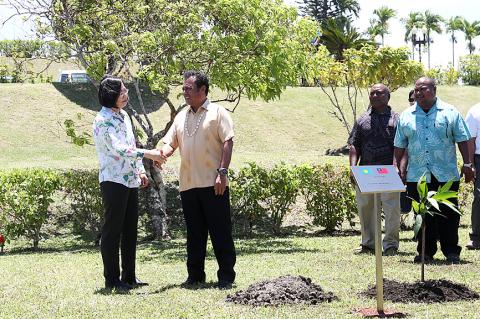President Tsai Ing-wen’s (蔡英文) transit through the US after her visit to three of Taiwan’s Pacific allies is standard practice, the US Department of State said on Thursday.
“President Tsai’s transit through the United States is based on long-standing US practice, and is consistent with the unofficial nature of our relations with Taiwan,” the department said in a statement.
Tsai on Thursday arrived in Palau on the first stop of her eight-day trip to Palau, Nauru and the Marshall Islands, her sixth overseas visit and her second trip to the nation’s Pacific allies since taking office in May 2016.

Photo: CNA
She is scheduled to stay in Palau until today and Nauru from tomorrow to Monday, before arriving in the Marshall Islands on Tuesday for the first-ever Pacific Women Leaders’ Coalition Conference, which is to be held on Tuesday and Wednesday, the Ministry of Foreign Affairs said.
The president is to fly from the Marshall Islands to Hawaii for a stopover on Wednesday, and is scheduled to arrive in Taiwan at 8:20pm on Thursday, the ministry said.
“These transits are undertaken out of consideration for the safety, comfort, convenience and dignity of the traveler,” the department said.
“There has been no change to the US’ ‘one China’ policy, which is based on the Three Joint Communiques and the Taiwan Relations Act,” it said.
The Taiwan Relations Act was enacted in 1979 after Washington severed ties with Taipei, with the aim of defining future unofficial relations between the US and Taiwan.
“President Tsai’s transits will be private and unofficial,” the department said.
American Institute in Taiwan (AIT) Chairman James Moriarty is to greet Tsai when she arrives in Hawaii, it said, emphasizing that the AIT is the institution that carries out Washington’s unofficial ties with Taipei.
The statement reiterated that the US encourages authorities in Taiwan and China to “engage in constructive dialogue that seeks a peaceful resolution of differences acceptable to the people of both sides of the Taiwan Strait.”
In Palau yesterday, Tsai met with Palauan President Tommy Remengesau.
The two participated in a tree-planting ceremony, during which Tsai planted a Jinhuang mango sapling and Remengesau planted an Irwin mango sapling to represent the two nations’ close ties.

The CIA has a message for Chinese government officials worried about their place in Chinese President Xi Jinping’s (習近平) government: Come work with us. The agency released two Mandarin-language videos on social media on Thursday inviting disgruntled officials to contact the CIA. The recruitment videos posted on YouTube and X racked up more than 5 million views combined in their first day. The outreach comes as CIA Director John Ratcliffe has vowed to boost the agency’s use of intelligence from human sources and its focus on China, which has recently targeted US officials with its own espionage operations. The videos are “aimed at

STEADFAST FRIEND: The bills encourage increased Taiwan-US engagement and address China’s distortion of UN Resolution 2758 to isolate Taiwan internationally The Presidential Office yesterday thanked the US House of Representatives for unanimously passing two Taiwan-related bills highlighting its solid support for Taiwan’s democracy and global participation, and for deepening bilateral relations. One of the bills, the Taiwan Assurance Implementation Act, requires the US Department of State to periodically review its guidelines for engagement with Taiwan, and report to the US Congress on the guidelines and plans to lift self-imposed limitations on US-Taiwan engagement. The other bill is the Taiwan International Solidarity Act, which clarifies that UN Resolution 2758 does not address the issue of the representation of Taiwan or its people in

DEFENDING DEMOCRACY: Taiwan shares the same values as those that fought in WWII, and nations must unite to halt the expansion of a new authoritarian bloc, Lai said The government yesterday held a commemoration ceremony for Victory in Europe (V-E) Day, joining the rest of the world for the first time to mark the anniversary of the end of World War II in Europe. Taiwan honoring V-E Day signifies “our growing connections with the international community,” President William Lai (賴清德) said at a reception in Taipei on the 80th anniversary of V-E Day. One of the major lessons of World War II is that “authoritarianism and aggression lead only to slaughter, tragedy and greater inequality,” Lai said. Even more importantly, the war also taught people that “those who cherish peace cannot

US Indo-Pacific Commander Admiral Samuel Paparo on Friday expressed concern over the rate at which China is diversifying its military exercises, the Financial Times (FT) reported on Saturday. “The rates of change on the depth and breadth of their exercises is the one non-linear effect that I’ve seen in the last year that wakes me up at night or keeps me up at night,” Paparo was quoted by FT as saying while attending the annual Sedona Forum at the McCain Institute in Arizona. Paparo also expressed concern over the speed with which China was expanding its military. While the US